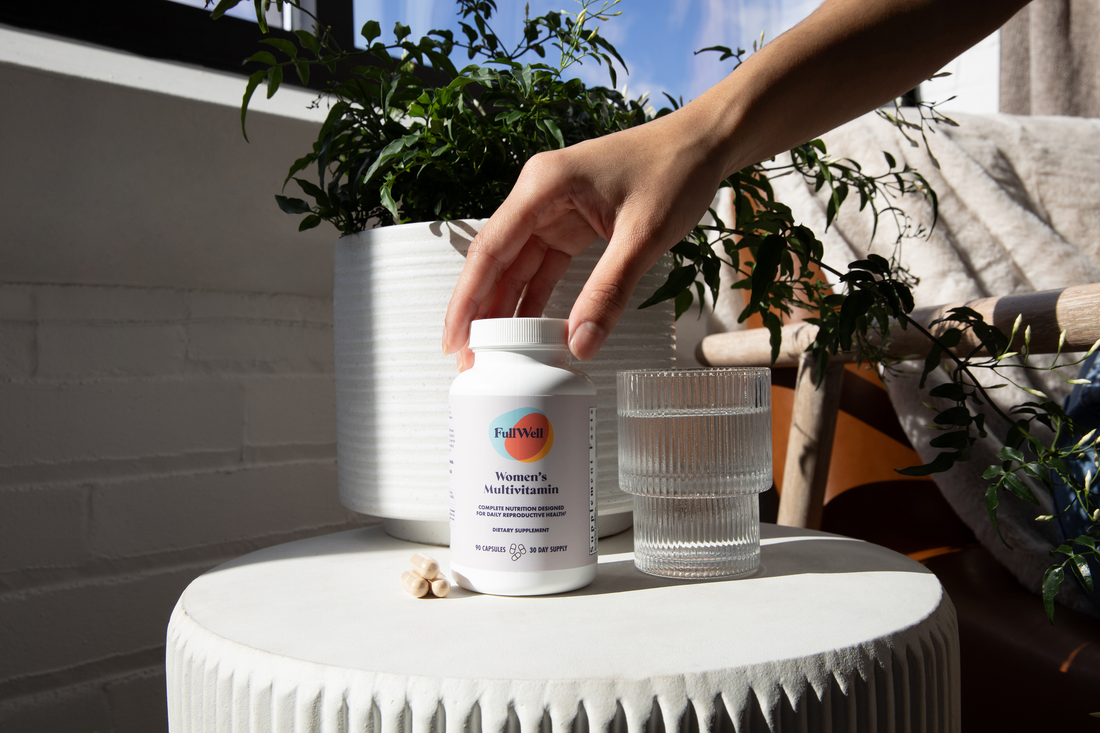Caring for your reproductive health before trying to conceive & why it's important
TL;DR
- Taking care of your reproductive health today isn’t just about fertility or immediate well-being. It’s about building a strong foundation for your long-term health and shaping the health of future generations.
- Our bodies thrive when they get the right amount of nutrients, but today’s world makes that harder than ever. Processed foods, environmental toxins, stress, and even some medications can deplete key nutrients needed for overall and reproductive health.
- While we can’t change our genetic blueprint, we can influence how our genes express themselves through lifestyle factors, a concept known as epigenetics.
- Nourishing your body with key nutrients, managing stress, and addressing health concerns proactively can help support reproductive and long-term health, even in the face of inherited predispositions.

Taking care of your reproductive health today isn’t just about fertility or immediate well-being. It’s about building a strong foundation for your long-term health and shaping the health of future generations.
Our bodies thrive when they get the right amount of nutrients, but today’s world makes that harder than ever. Processed foods, environmental toxins, stress, and even some medications can deplete key nutrients needed for overall and reproductive health. This is where a holistic approach comes in.
By supporting hormonal balance, mood stability, energy production, and bone strength, you’re laying the foundation for long-term health.
While we can’t change our genetic blueprint, we can influence how our genes express themselves through lifestyle factors, a concept known as epigenetics. Nourishing your body with key nutrients, managing stress, and addressing health concerns proactively can help support reproductive and long-term health, even in the face of inherited predispositions.
What is reproductive health?
Reproductive health is the function and balance of the reproductive system, including hormone regulation, fertility, and overall wellness, regardless of whether or not someone plans to have children.
Reproductive health is not just important during specific life stages like preconception or pregnancy, it’s also a foundational aspect of overall health.
Prioritizing it helps ensure that your body remains in balance, supporting both physical and mental well-being, regardless of whether or not parenthood is part of your plan.
Reproductive health is a reflection of overall health
Reproductive health is a reflection of overall health because it relies on balanced hormones, proper nutrition, and optimal body function, all of which are essential for overall well-being, too.
When the body is under stress, nutrient-deficient, or struggling with underlying health issues, it can disrupt reproductive function, making it a key indicator of overall health status.
Women’s generational health
Generational health refers to how our genetic traits (aka the genes we inherit), health risks, and lifestyle choices are passed down across generations, influencing our overall well-being. While we can't change our genetic makeup, we can affect how our genes express themselves through lifestyle factors.
By nourishing our bodies with key nutrients, managing stress, and proactively addressing health concerns, we can support our reproductive and long-term health, even despite inherited predispositions.
Although food and supplements can't override genetics, they significantly contribute to our body's optimal functioning, empowering us to play an active role in our health.
The choices we make today not only impact our own health but can also affect the health of our children and grandchildren. For women, supporting generational health is crucial, especially when it comes to fertility, conception, pregnancy planning, and postpartum care. Since women are born with all the eggs they will ever have, the health of these eggs plays a key role in reproductive success and the health of generations to come.
A single pregnancy can influence three generations: the mother (first generation), her unborn baby (second generation), and, if the baby is a girl, her developing eggs can impact the third generation's health. This highlights why investing in reproductive health today can have lasting effects across generations, promoting healthier futures.
If you begin a fertility journey already lacking essential nutrients, your body may struggle to catch up, which can impact your ability to conceive and maintain a healthy pregnancy.
How to take action for better overall and reproductive health
Modern life can deplete essential nutrients due to stress, diet, hormonal birth control, and medications, all of which may impact reproductive health, aging, and overall well-being.
Rather than just filling gaps, focus on actively supporting your body to build a strong foundation for long-term health, whether or not parenthood is in your plans.
Here’s how you can take actionable steps:
1. Aim for a nutrient-dense, balanced diet
A well-rounded diet filled with whole foods—like fresh fruits, vegetables, animal proteins, and healthy fats—provides essential nutrients for optimal health.
2. Manage stress and include regular movement
Try practices like mindfulness, meditation, or deep breathing, establish a consistent sleep routine, and stay active with exercises such as walking or yoga to enhance wellbeing.
3. Balance your hormones
B vitamins and antioxidants like R-lipoic acid play a vital role in a healthy menstrual cycle and hormone production, creating a healthy foundation for optimal reproductive health.* B vitamins are particularly important, as they can become depleted in individuals using hormonal birth control.
Critical nutrients, minerals, and antioxidants, such as vitamin D, selenium, R-lipoic acid, and NADH, support hormone production, helping to establish a healthy foundation for optimal reproductive health, especially during periods of transition or replenishment.*
You can find B vitamins in foods like animal products, particularly poultry, beef, pork, and organ meats (like liver), leafy greens, beans, whole grains, and eggs.
Antioxidants like R-lipoic acid are found in foods like spinach, broccoli, and organ meats.
Vitamin D can be sourced from fatty fish, mushrooms, fortified dairy, and sunlight, while selenium is abundant in Brazil nuts, sunflower seeds, and seafood.
NADH is naturally present in small amounts in foods like chicken, beef, and other meats.
4. Combat aging and oxidative stress with antioxidants
Aging begins at the cellular level and can be sped up by factors like pollution, poor sleep, and not allowing your body enough recovery time after physical activity. Signs of insufficient recovery include persistent fatigue, soreness, mood changes, and increased illness. If you’re feeling worn down despite regular rest, it might be time to slow down.
To support your cells and slow aging, aim for antioxidant protection from vitamin C, E, resveratrol, r-lipoic acid, coenzyme Q10 (CoQ10), pyrroloquinoline quinone (PQQ), and NADH* (Nicotinamide Adenine Dinucleotide + Hydrogen is a coenzyme that plays a crucial role in cellular energy production).
You can find vitamin C in citrus fruits, strawberries, and bell peppers; vitamin E in nuts, seeds, and leafy greens; resveratrol in grapes, and berries; R-lipoic acid in spinach, broccoli, and organ meats; CoQ10 in fatty fish, spinach, and whole grains; and NADH in meat, poultry, and fish.
These antioxidants help protect cells and support energy production in addition to:
- Protecting egg quality before ovulation and during maturation.*
- Supporting uterine health by shielding the uterine lining from oxidative damage* (Oxidative damage happens when there’s an imbalance between harmful molecules called free radicals and the antioxidants that normally keep them in check. Think of it like your body being overwhelmed by stress—it just can’t keep up, and that leads to damage at the cellular level.)
- Maintaining mitochondrial function (the body's energy-producing "battery”), essential for energy production in eggs.*
- Reducing inflammation caused by oxidative stress, supporting overall reproductive organ health.*
5. Support your immune health
Supporting your immune health is key to fostering overall well-being and ensuring your body is primed for reproductive vitality. Look for nutrients like:
- Vitamin A – Supports mucosal barriers and immune cell activity*
- Vitamin C – Antioxidant, aids immune cell production*
- Vitamin D – Regulates immune system function*
- Zinc – Supports immune cell development and protection* (you can find zinc in berries, nuts and red meat)
6. Support your cognitive health
Taking a whole-body approach to reproductive care means prioritizing cognitive health as a key part of overall wellbeing to help foster a healthy mind so you're ready if you decide to try to conceive.
- B-Vitamins (Folate & B12) – Essential for neurotransmitter production and brain health* (folate can be found in foods like spinach, liver and sunflower seeds)
- Iodine – Supports cognitive function by aiding thyroid hormone production, essential for brain development and performance* (found in foods like seaweed, shellfish and beef liver)
- Magnesium – Aids brain and nervous system function, immune regulation*(found in foods like pumpkin seeds, avocado, dark chocolate)
Regardless of where you are in your reproductive journey, maintaining a strong nutrient foundation is crucial. If you choose to conceive, replenishing key nutrients on an ongoing basis ensures your body isn’t forced to play catch-up.
7. Fill dietary gaps with a quality multivitamin
Supplementation can help bridge any nutrient gaps, such as adding vitamins or minerals that may be missing from your diet, ensuring your body has the support it needs.
What is the best multivitamin for women?
When choosing the best women’s multivitamin to take, there are a few key considerations. In addition to looking for highly bioavailable nutrients in optimal forms and doses to maximize your body’s absorption, consider factors like sourcing, the quality of the ingredients, and whether it has undergone rigorous testing.
Chelated Minerals for Superior Absorption
Specially designed for better absorption and easier uptake by the body, chelated minerals ensure you get the maximum benefits from every dose.*
Complete B-Complex in Bioavailable Forms
Unlike many multis that skimp on B vitamins, we include all 8 B vitamins in their most active forms, including methylated B12 and Folate (5-MTHF), supporting energy, cognitive function, and mood balance.*
Thoughtfully Excluded Nutrients
Iron
Iron needs vary from person to person and change during pregnancy, so we leave it out of our Women’s Multivitamin. We recommend testing your levels and supplementing only as needed, allowing you to tailor your dose to your individual needs—so you don’t get too much or too little iron.
Iron can interfere with the absorption of certain medications and nutrients, so it’s best to take it at least two hours before or after:
- Iron, milk, calcium, or magnesium products
- Coffee, tea, or cereal
- Proton pump inhibitors
Iron supports the formation and maintenance of healthy red blood cells while helping to transport oxygen to tissues.* It also plays a role in normal thyroid function, placental development, and energy metabolism.*
Choose an omega-3 supplement that’s not in your multivitamin to preserve the stability and potency and tailor to your needs and/or life stage. Look for products made from sustainably sourced, wild-caught fish to support both your health and the environment.
If you decide to try to conceive, Omega-3s play a crucial role in promoting baby’s brain, nervous system, and vision development.*
Third party tested products
Choose companies that go above and beyond industry standards to ensure the safety and quality of their supplements. Look for those that conduct third-party testing on every single batch to verify identity and check for contaminants, including heavy metals like lead, and that comply with Prop 65 regulations. This added layer of scrutiny ensures that the multivitamin you’re taking is both effective and free from harmful substances.
Every batch of our Women’s Multivitamin is rigorously screened for ingredient accuracy, heavy metals, and the top 8 allergens, ensuring safety, Prop 65 compliance, and no unnecessary additives or preservatives.
FullWell’s Women’s Multivitamin
Our Women’s Multivitamin is more than just a daily supplement. It’s your foundation for long-term reproductive and overall wellness.
Formulated to address common nutrient gaps, it supports your reproductive health now while laying the groundwork for future fertility and hormone balance as you age.
With comprehensive nutritional support, it delivers ideal vitamins, minerals, and advanced antioxidants, like CoQ10 and PQQ, to support hormonal balance, mood stability, energy production, and bone strength, empowering you to take charge of your long-term health, whether or not parenthood is in your plans.*






